Helping Families After Divorce

Divorce expert M. Gary Neuman has appeared on the show to discuss the right ways to tell your children that you're getting a divorce . But what if you're already divorced? Gary's back to answer two important questions—"Can you repair the mistakes you've already made with your children?" and "If so, how?"
Gary says parents can always fix the errors of the past. "Children crave the love and attention from parents. So no matter what you've done, you might have to have remorse and apologize, you might have to keep trying, but children do open up. I don't care if it's years later, they always have a place in their heart for their parents, and parents can always reenter their lives," he says. "But when they do that, [parents] have to be genuine about it and stick with it and be consistent."
One important thing to keep in mind, Gary says, is when you say negative things about the other parent, you are actually saying something negative about your child. "You criticize their DNA—they are a part of both Mom and Dad," Gary says. "You can't say, 'Mom is rotten,' or 'Dad is bad,' and not have that reflect on me, the kid. That means I'm partially that."
Instead of blaming the other parent, parents should focus on the future. "You have to take responsibility for yourself and what we can do moving forward, no matter what," he says.
Gary says parents can always fix the errors of the past. "Children crave the love and attention from parents. So no matter what you've done, you might have to have remorse and apologize, you might have to keep trying, but children do open up. I don't care if it's years later, they always have a place in their heart for their parents, and parents can always reenter their lives," he says. "But when they do that, [parents] have to be genuine about it and stick with it and be consistent."
One important thing to keep in mind, Gary says, is when you say negative things about the other parent, you are actually saying something negative about your child. "You criticize their DNA—they are a part of both Mom and Dad," Gary says. "You can't say, 'Mom is rotten,' or 'Dad is bad,' and not have that reflect on me, the kid. That means I'm partially that."
Instead of blaming the other parent, parents should focus on the future. "You have to take responsibility for yourself and what we can do moving forward, no matter what," he says.
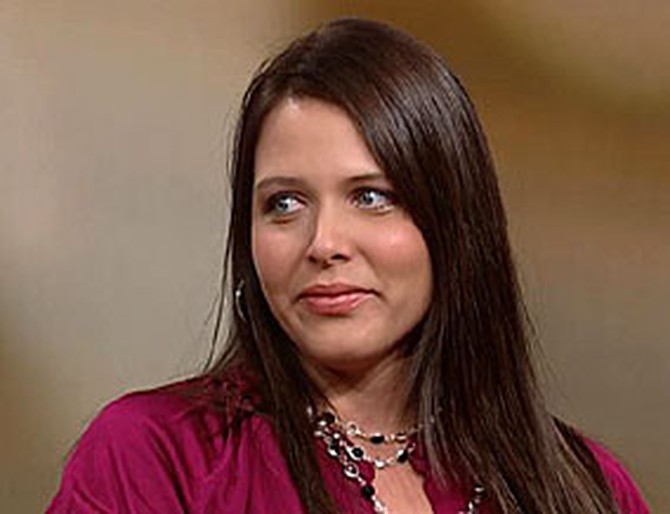
Jennifer, a 31-year-old divorced mother of four daughters, says seeing 7-year-old Kris's emotional reaction to his parents' divorce made her realize what her own daughters were feeling. "I just looked at my girls as they were watching that, too," she says. "I could see that they were relating to him, and I knew that I related to some of the things that father was going through."
In the five years since her divorce, Jennifer says her ex-husband has chosen not to be involved much with the children. "I think the rejection and the hurt after so long has just turned into anger," she says. "I have four angry children, I think, at times. They fight constantly. They fight with me."
Even though she knows her daughters are feeling sad and mad, Jennifer says they won't discuss it. "They just say, 'I don't want to talk about it,' because they don't want any more hard feelings than I already have toward their dad. They don't want to let me know what they're feeling because I've already got enough." Jennifer says it hurts that she cannot make her daughters feel better. "They shouldn't have to have that. They shouldn't have to carry that pain as children."
Jennifer's mistake, Gary says, is allowing the girls to feel how stressed she is. "Something has gotten across to the children that said I'm so tired and overwhelmed and overburdened… and part of that's tied into … because your dad won't take you ," Gary says. "Although it might be real, it's time to kind of move on and be able to say that, 'Look, no matter how difficult it is, I'm here for you. I can handle it. Sometimes I'm tired and we'll talk later, fine. But whether your dad's in your life, not in your life, this is the family that we have and we're going to make this family work until anything changes.' And that's a big piece of trying to move on."
In the five years since her divorce, Jennifer says her ex-husband has chosen not to be involved much with the children. "I think the rejection and the hurt after so long has just turned into anger," she says. "I have four angry children, I think, at times. They fight constantly. They fight with me."
Even though she knows her daughters are feeling sad and mad, Jennifer says they won't discuss it. "They just say, 'I don't want to talk about it,' because they don't want any more hard feelings than I already have toward their dad. They don't want to let me know what they're feeling because I've already got enough." Jennifer says it hurts that she cannot make her daughters feel better. "They shouldn't have to have that. They shouldn't have to carry that pain as children."
Jennifer's mistake, Gary says, is allowing the girls to feel how stressed she is. "Something has gotten across to the children that said I'm so tired and overwhelmed and overburdened… and part of that's tied into … because your dad won't take you ," Gary says. "Although it might be real, it's time to kind of move on and be able to say that, 'Look, no matter how difficult it is, I'm here for you. I can handle it. Sometimes I'm tired and we'll talk later, fine. But whether your dad's in your life, not in your life, this is the family that we have and we're going to make this family work until anything changes.' And that's a big piece of trying to move on."
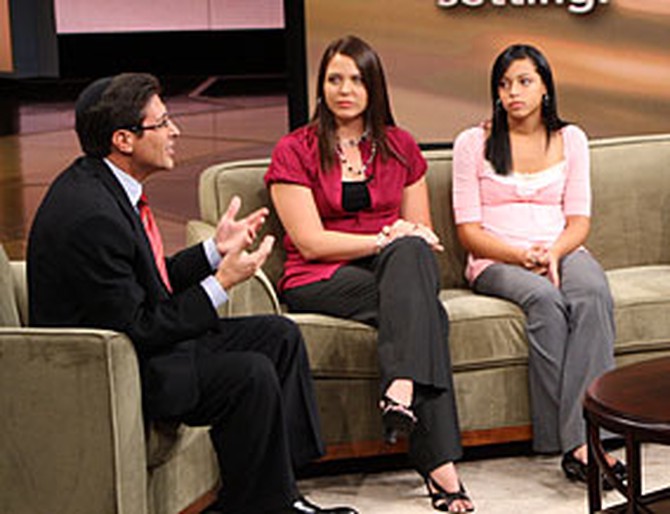
Jennifer's four daughters, MaRyah, Mikennah, Onaleah and Kaylah, tell Gary that while their father lives close, they rarely get to see him. Gary tells Jennifer that each of the girls is suffering in her own way—from expressing anger to bottling up her feelings. "You as a parent have to know that they're all going to react, and we have to kind of work with the private time … to get them to open up so they can express it out instead of keeping it in and acting it out."
Sometimes, a mom can inadvertently get in the way of her children's relationship with their father, Gary says. "There are times when moms will criticize everything the dad's doing when he's with the kids. 'You're only watching TV with them. You didn't do the homework well enough.' Although that's not an excuse, it sometimes makes some of these dads more prone to saying, 'Well, I just can't take them and watch them.'"
Jennifer says she thinks her ex-husband stays away in order to punish her. "He has said that to me many times, 'You chose this for yourself, now deal with it.'" Since the divorce, the girls say they have tried to tell their father how they feel, but Jennifer doesn't think he understands. "Especially Kaylah, she has no problem getting on the phone and expressing, crying, 'Please, Dad, please.' He doesn't seem to feel their pain. He doesn't seem to understand what it's doing to them."
Gary says he hopes things improve, but sometimes the situation can't be changed. "There's a point at which you get so stuck in it and you can't make that other person do and be responsible, so you have to say, 'Look, we're a family. We're going to make new traditions. We're going to do what we're going to do. We're going to do great and be a wonderful family because of it.'"
The girls' father declined an invitation to appear on The Oprah Show. He told the producers that he is unable to spend more time with his daughters because he has to work to pay child support.
Sometimes, a mom can inadvertently get in the way of her children's relationship with their father, Gary says. "There are times when moms will criticize everything the dad's doing when he's with the kids. 'You're only watching TV with them. You didn't do the homework well enough.' Although that's not an excuse, it sometimes makes some of these dads more prone to saying, 'Well, I just can't take them and watch them.'"
Jennifer says she thinks her ex-husband stays away in order to punish her. "He has said that to me many times, 'You chose this for yourself, now deal with it.'" Since the divorce, the girls say they have tried to tell their father how they feel, but Jennifer doesn't think he understands. "Especially Kaylah, she has no problem getting on the phone and expressing, crying, 'Please, Dad, please.' He doesn't seem to feel their pain. He doesn't seem to understand what it's doing to them."
Gary says he hopes things improve, but sometimes the situation can't be changed. "There's a point at which you get so stuck in it and you can't make that other person do and be responsible, so you have to say, 'Look, we're a family. We're going to make new traditions. We're going to do what we're going to do. We're going to do great and be a wonderful family because of it.'"
The girls' father declined an invitation to appear on The Oprah Show. He told the producers that he is unable to spend more time with his daughters because he has to work to pay child support.
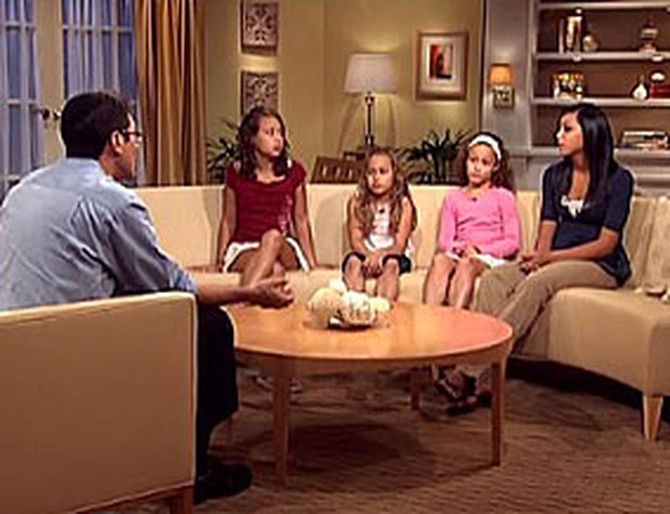
In many divorces, children often keep their true emotions hidden. Gary sat
down with each one of the girls to find out what they were really feeling.
MaRyah says she remembers hearing her parents argue but never told anyone.
Onaleah says the worst thing about the divorce is not getting to see her dad and
missing out on things like the father-daughter dance at school. Mikennah says
she's never told anyone at school that her parents are really divorced. "They'll
think that I don't have a dad," Mikennah says. Kaylah says she has a quick
temper and can get so angry that she feels almost like a different person.
Gary has come up with five steps that every parent can use to help their children open up.
Choose an informal setting. Try to avoid having a big, family meeting. "One of the ways to shut down a kid is to say, 'Tell me how you feel about the divorce.' That's it. You'll never hear from them again," he says. "It's about going to the pizza shop, having dinner together, it's the long drive in the car, it's the cuddling in bed. Those are the times that are relaxing and not threatening to kids."
Don't be a conversation killer. "This is the number one thing that loving parents do. The children do come to you and they do talk, but they learn not to talk to you because you really don't listen to their feelings," Gary says. "Recently I had someone say that a kid came to them and said, 'I can't believe Dad is marrying that woman.' She said back to her daughter, 'Honey, listen. Dad loves you. He's a good man and he's allowed to get married.' Good answer? Wrong answer! Because what you've just said to your child is, 'That's not a good feeling. You're not supposed to feel sad or mad.' … When you do that you're basically saying to your child there's nothing more for me as a kid to say to you. I'm done. You've told me my feeling is wrong.'"
Put yourself in their shoes. "It's so important to lose yourself when you're talking with your child. Meaning, it's not about how I feel about the child or how I am worried about them, it's really just trying to hear what it's like to be them in that moment," Gary says. "If you really do that in your heart, you will always say the right thing. And you will say things like, 'It sounds like you feel really sad, kind of mad that Dad's not around' and 'when you say things like that, it sounds like you feel, kinda, maybe, a little sad or mad'—and just stop. They'll say, 'Wow, yeah, I do feel that way,' and they'll continue, and they'll start talking to you."
Initiate the conversation. Gary says too many parents avoid bringing up certain subjects because they're afraid they'll make their kids feel sad. "If they're not sad or you get the feeling wrong, they'll correct you. You're not going to make them feel that way. So if they are not talking or if they've had a conversation and you need to talk about it again, just bring it up. You can even say, 'Listen, I know you must be feeling kind of sad. If I were you, I'd feel that way.' Let them know it's okay and we're going to keep talking about it and eventually they'll open up."
Welcome tears and emotion. "The hardest thing as a parent is to really see your child in pain, especially when you think that somehow you have contributed to that pain," he says. "I'm here to say as a father of five, we've all screwed up. We've all made mistakes. We've all contributed to the problems of our children as well as the wonderful things of our children. Don't feel guilty, because that guilt sometimes stops you from wanting to see it, and it's so much better to just be able to see it. Be welcome to it. And I'm telling you understanding and getting your child is the greatest gift you can ever give to your child. … They will heal through love and connection.
Gary has come up with five steps that every parent can use to help their children open up.
Choose an informal setting. Try to avoid having a big, family meeting. "One of the ways to shut down a kid is to say, 'Tell me how you feel about the divorce.' That's it. You'll never hear from them again," he says. "It's about going to the pizza shop, having dinner together, it's the long drive in the car, it's the cuddling in bed. Those are the times that are relaxing and not threatening to kids."
Don't be a conversation killer. "This is the number one thing that loving parents do. The children do come to you and they do talk, but they learn not to talk to you because you really don't listen to their feelings," Gary says. "Recently I had someone say that a kid came to them and said, 'I can't believe Dad is marrying that woman.' She said back to her daughter, 'Honey, listen. Dad loves you. He's a good man and he's allowed to get married.' Good answer? Wrong answer! Because what you've just said to your child is, 'That's not a good feeling. You're not supposed to feel sad or mad.' … When you do that you're basically saying to your child there's nothing more for me as a kid to say to you. I'm done. You've told me my feeling is wrong.'"
Put yourself in their shoes. "It's so important to lose yourself when you're talking with your child. Meaning, it's not about how I feel about the child or how I am worried about them, it's really just trying to hear what it's like to be them in that moment," Gary says. "If you really do that in your heart, you will always say the right thing. And you will say things like, 'It sounds like you feel really sad, kind of mad that Dad's not around' and 'when you say things like that, it sounds like you feel, kinda, maybe, a little sad or mad'—and just stop. They'll say, 'Wow, yeah, I do feel that way,' and they'll continue, and they'll start talking to you."
Initiate the conversation. Gary says too many parents avoid bringing up certain subjects because they're afraid they'll make their kids feel sad. "If they're not sad or you get the feeling wrong, they'll correct you. You're not going to make them feel that way. So if they are not talking or if they've had a conversation and you need to talk about it again, just bring it up. You can even say, 'Listen, I know you must be feeling kind of sad. If I were you, I'd feel that way.' Let them know it's okay and we're going to keep talking about it and eventually they'll open up."
Welcome tears and emotion. "The hardest thing as a parent is to really see your child in pain, especially when you think that somehow you have contributed to that pain," he says. "I'm here to say as a father of five, we've all screwed up. We've all made mistakes. We've all contributed to the problems of our children as well as the wonderful things of our children. Don't feel guilty, because that guilt sometimes stops you from wanting to see it, and it's so much better to just be able to see it. Be welcome to it. And I'm telling you understanding and getting your child is the greatest gift you can ever give to your child. … They will heal through love and connection.
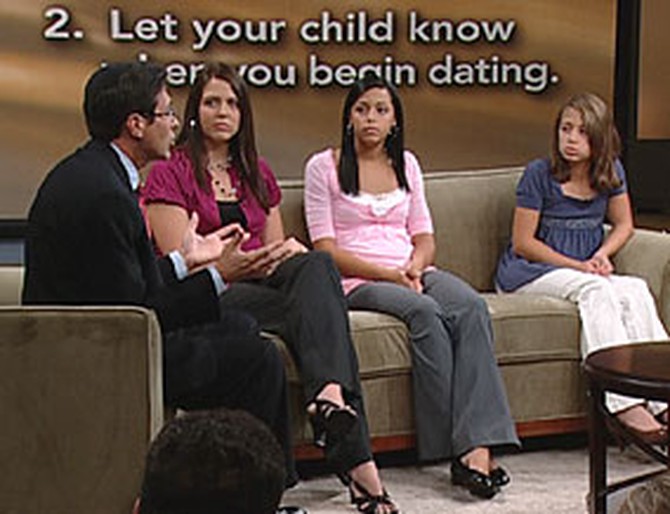
Jennifer says she and her ex-husband have both began dating, a situation many divorced parents may face.
If you're a divorced parent who is considering dating, Gary has five golden rules to help you help your children get used to you dating, getting serious with a new boyfriend or girlfriend, and potentially marrying someone in gradual stages.
If you're a divorced parent who is considering dating, Gary has five golden rules to help you help your children get used to you dating, getting serious with a new boyfriend or girlfriend, and potentially marrying someone in gradual stages.
- Wait one year from separation before dating seriously. "Your children deserve time to adjust before yet another person comes into their lives and we mix all this up and possibly other children from that significant other," he says. "Please remember second marriages have a higher divorce rate than first marriages. It's really crucial during that year to try to look at what you've done that contributed to the failure of your marriage so that you can have a better relationship in the future."
- Let your child know when you begin dating. Gary suggests telling your children in a casual way. Here's a script you can use: "I'm going to start kind of making friends, nothing serious. I know that this might make you a little sad because you might think if I get along with somebody then me and Dad aren't getting together. But we tried our best. Dad and I aren't going to get back together regardless of whether I date or not. Most of all, look, anything that's a little bit serious, you'll be the first to know. I'm going to include you and I'm not even going to do it much when you're around because I want to spend time with you.'"
- Don't allow your child to form any relationship with a boyfriend or girlfriend until you're close to a long-term commitment in the relationship. "This is one of the biggest mistakes. They've already lived through so much drama, they fall in love with these new people that come in their lives really quickly. And they're out, and they're gone, and that's it. They suffer again. We want to minimize that."
- Introduce your child with a non-threatening outing. Avoid having a big dinner or a weekend away. Instead, Gary says to try going to the park or a video arcade. "Let it happen slowly and over time. And when you do introduce them to somebody who you really feel like you're falling in love with, don't even think of getting engaged until many months because the children deserve many months to slowly get to know that person. And that is what's going to make them not hate that person, and you're going to have a much better second marriage when everyone gets along so much better."
- Preserve private time with your child away from your significant other. "There is a family history before this significant other came in. And for really a couple of years, even if another person is around, you should have some time where you and the kids go out alone without that other person," Gary says. "Don't force that person in there and now he's always around. No matter how great that person is, it's not going to work."
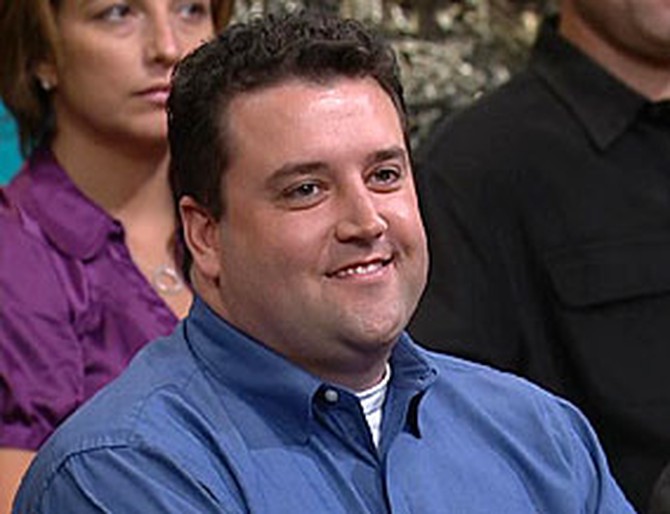
For the last year and eight months, Jennifer has been seeing Matthew, who has five kids of his own. Although they're serious, the couple doesn't live together. "We're taking a very long time," Matthew says. "She still has her home and her family time, and I have my home and my family time, and that's just how it works right now."
So what's it like when all nine kids get together? "It depends, the moods change so much. One child can have a really hard time of wanting to be with them, and sometimes we all get along so well," Matthew says.
Gary says blended families take a lot of thought and planning. Here are three simple ideas to make those families work:
Another thing Gary says parents need to be aware of is that not all your children are brothers and sisters. "Sometimes they become a little fond of each other and people say, 'Oh no, they're just brothers and sisters.' They're not," Gary says. "There are teenagers who are step-siblings who could really like each other. And that's why the rules of walking around the house, perhaps in your underwear or whatever, that might work with blood siblings, but that's not something you want to do. You want to really watch those limitations and be respectful of those issues in your household."
Gary says blended families should take things in stages. For example, Kaylah told Gary that she really liked Matt because he didn't immediately act like their dad and tell them what to do. "I like for step-parents to think of themselves in the beginning as a lovely aunt or uncle—I'm here for great advice if you want to have fun. I'm not here to tell you what to do all the time," Gary says.
So what's it like when all nine kids get together? "It depends, the moods change so much. One child can have a really hard time of wanting to be with them, and sometimes we all get along so well," Matthew says.
Gary says blended families take a lot of thought and planning. Here are three simple ideas to make those families work:
- Create new family traditions. "This family needs something new to work around. So you have the Saturday night movie night that, no matter what, we're all going to be together," he says. "A great idea is family dinner night about a certain country. So certain kids are cooking that country's food, certain kids are getting the music, certain ones are making the flag. That way we're all doing something together and we're creating something new that makes this family unique."
- Only the biological parent should discipline. "This is a big mistake a lot of people make. And I daresay there are a lot of men who kind of go off and leave their wives, the new step-mom, to do a lot of things with the kids. Don't put yourself in that position because every single kid will look at that step-mom and say, 'Who died and made you boss?'"
- Use similar rules for same-aged children. "Keep in mind, you could have two 13-year-olds—one's used to going out until 2 a.m., and the other one's used to going out and has to be home at 11 p.m—that's going to become complicated," Gary says. "So as two parents, you have to sit down and say, 'How are we going to change the rules so they are more common for all of our children?'"
Another thing Gary says parents need to be aware of is that not all your children are brothers and sisters. "Sometimes they become a little fond of each other and people say, 'Oh no, they're just brothers and sisters.' They're not," Gary says. "There are teenagers who are step-siblings who could really like each other. And that's why the rules of walking around the house, perhaps in your underwear or whatever, that might work with blood siblings, but that's not something you want to do. You want to really watch those limitations and be respectful of those issues in your household."
Gary says blended families should take things in stages. For example, Kaylah told Gary that she really liked Matt because he didn't immediately act like their dad and tell them what to do. "I like for step-parents to think of themselves in the beginning as a lovely aunt or uncle—I'm here for great advice if you want to have fun. I'm not here to tell you what to do all the time," Gary says.
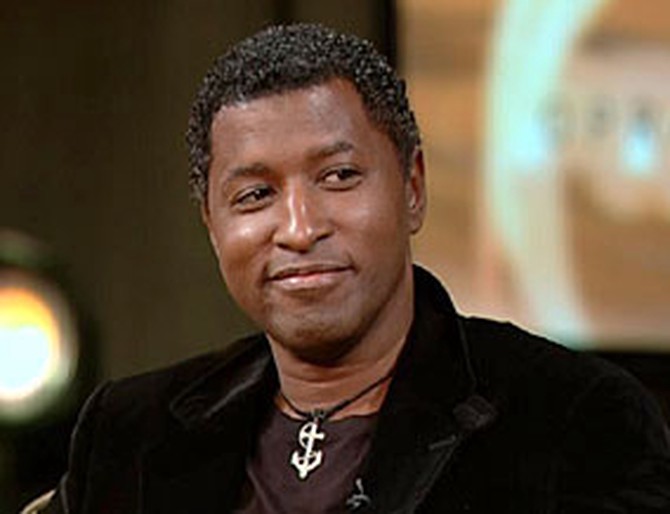
Kenny "Babyface" Edmonds is a 10-time Grammy Award winner and the name behind 125 mega-hits for artists like Madonna, Whitney Houston and Mariah Carey. With his wife, Tracey, and their two sons, 11-year-old Brandon and 6-year-old Dylan, by his side, it seemed like Babyface had a perfect life.
Then in 2007, Babyface and Tracey—who, he says, never fought in public—stunned family and friends with the news that their 13-year marriage was over. "Part of the problem a lot of times in relationships, there may be questions that you want to ask and answers that you don't want to hear. And so you get to a point to where you kind of live in front of everyone else, and even though you may have issues, you kind of ignore them and just kind of keep it together because you have this perfect picture so you don't want anybody else to be disappointed."
At one point, Babyface says they started being honest with one another and themselves. "That allowed us to actually become really closer friends and cooler people, and also we came to a point where maybe we're not exactly the perfect picture together," he says. "But in the process, we had two wonderful kids and we have a wonderful relationship because we're actually probably closer now than we were when we were married."
Telling the children was difficult, Babyface says, but they're doing great today. "Brandon, initially his reaction was, 'Well, what did you do?'" he says. "And we said, 'You know, it's not really about what anybody did at this particular point because, first of all, we want you guys to know that me and your mom, we love each other. We're just not gonna be, like, together. But we love each other like crazy. We're the best of friends. And in this situation, you don't really have to worry about it so much because we're gonna spend time together. Both people.'"
Then in 2007, Babyface and Tracey—who, he says, never fought in public—stunned family and friends with the news that their 13-year marriage was over. "Part of the problem a lot of times in relationships, there may be questions that you want to ask and answers that you don't want to hear. And so you get to a point to where you kind of live in front of everyone else, and even though you may have issues, you kind of ignore them and just kind of keep it together because you have this perfect picture so you don't want anybody else to be disappointed."
At one point, Babyface says they started being honest with one another and themselves. "That allowed us to actually become really closer friends and cooler people, and also we came to a point where maybe we're not exactly the perfect picture together," he says. "But in the process, we had two wonderful kids and we have a wonderful relationship because we're actually probably closer now than we were when we were married."
Telling the children was difficult, Babyface says, but they're doing great today. "Brandon, initially his reaction was, 'Well, what did you do?'" he says. "And we said, 'You know, it's not really about what anybody did at this particular point because, first of all, we want you guys to know that me and your mom, we love each other. We're just not gonna be, like, together. But we love each other like crazy. We're the best of friends. And in this situation, you don't really have to worry about it so much because we're gonna spend time together. Both people.'"
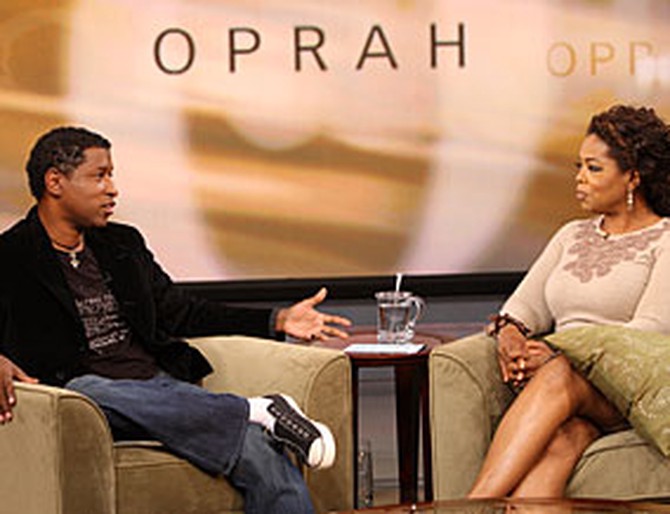
Like many divorced families, Babyface and Tracey have also talked to their children about what happens when one parent decides to remarry. In 2007, Tracey started dating and became engaged to actor Eddie Murphy. When they first started dating, Babyface says he was a little concerned about the publicity surrounding the relationship. "What I usually do in cases like that if something bothers me, I embrace it. I don't run away from it," he says. "You have to embrace things because the reality is, if Tracey's happy and she's happy with her life, then that's good because I want the same thing for myself and she wants the same for me."
Babyface says both he and Tracey eased into conversations with the boys. "You don't pull 'em and say, 'We're going to have a family meeting,'" he says. "You find something to do and in your conversations, just everyday conversations, you start bringing little things up. So how do you feel about this? How do you feel about that? They can give you the answer a little because they're not gonna give you everything at one time."
Babyface says both he and Tracey eased into conversations with the boys. "You don't pull 'em and say, 'We're going to have a family meeting,'" he says. "You find something to do and in your conversations, just everyday conversations, you start bringing little things up. So how do you feel about this? How do you feel about that? They can give you the answer a little because they're not gonna give you everything at one time."
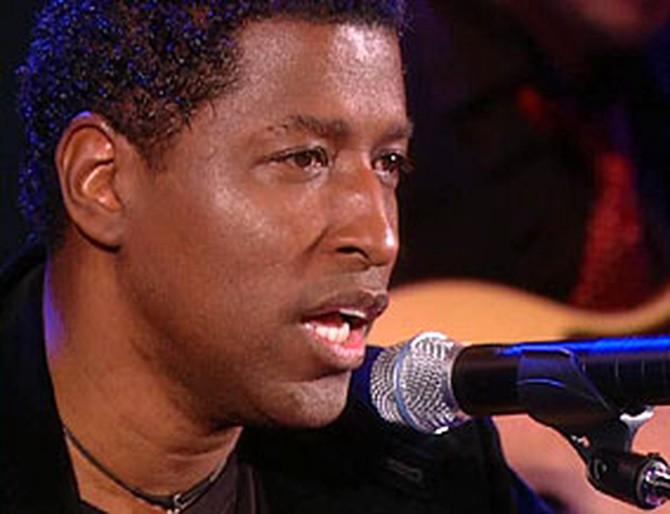
Through it all, Babyface says he and Tracey gave their kids one key message—no matter what, they are loved. In fact, the divorce inspired one of the most heartfelt songs on Babyface's album Playlist . Babyface wrote "Not Going Nowhere" for his boys and based it on "some of the conversations we had and their feelings and just wanting them to know that I wasn't going anywhere," he says.
"The main thing is that what's more important to them, I feel, is that they see that you're happy and that you're happy with them, you're happy with the mom. You're happy with the dad. That everybody's cool," he says. "Because the more that everybody's cool with each other, the more it eases them."
Gary says Babyface and Tracey have done the right thing. "There's no doubt that no matter what you do, like you're saying, if they know that you love each other and love them, the kids can get through anything," he says. "If their parents are really loving them and hearing them, they can get through any kinds of circumstances."
Watch what happens when Gary continues the conversation after the show.
.
"The main thing is that what's more important to them, I feel, is that they see that you're happy and that you're happy with them, you're happy with the mom. You're happy with the dad. That everybody's cool," he says. "Because the more that everybody's cool with each other, the more it eases them."
Gary says Babyface and Tracey have done the right thing. "There's no doubt that no matter what you do, like you're saying, if they know that you love each other and love them, the kids can get through anything," he says. "If their parents are really loving them and hearing them, they can get through any kinds of circumstances."
Watch what happens when Gary continues the conversation after the show.
.
Published 01/01/2006

